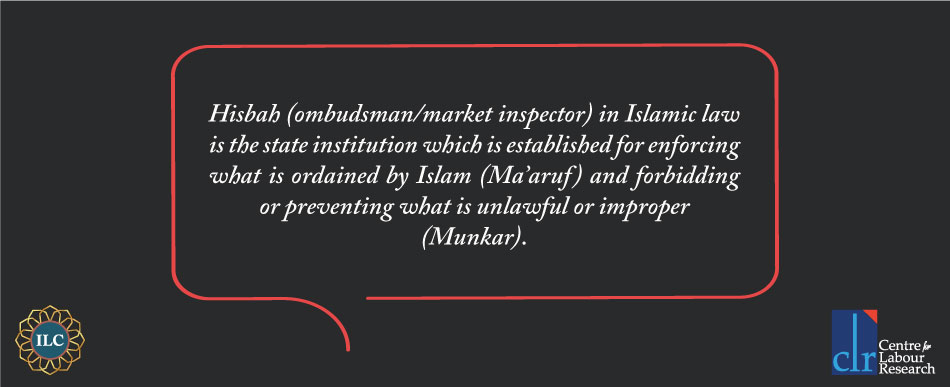Hisbah (ombudsman/market inspector) in Islamic law is the state institution which is established for enforcing what is ordained by Islam (Ma’aruf) and forbidding or preventing what is unlawful or improper (Munkar). The Quran considers it the obligation of every Muslim to play their role in hisbah and requires that some section of the society must remain engaged in that practice.[1] We find in ahadith that it was the practice of the Prophet (ﷺ) to visit markets and check the conditions and quality of products. Later on, he appointed two different market inspector/supervisors in the cities of Makkah and Medina. We also find reports of Umar (RA) appointing market inspectors and especially a woman as an inspector of the market in Medina. However, the specialized agencies for market inspection were first established during the time of Umayyad caliph, Hisham ibn Abd al-Malik (d. 743 AD).
The first writing on the institution of Hisbah was by Al-Mawardi (d. 1058 AD) in his famous book “Al-Ahkam al-Sultaniyyah” (The Ordinances of Government) as a full chapter. Another scholar (Abu Ya’ala, d. 1066 AD) at the same time discussed the hisbah institution in an Islamic state in his book with a similar title. However, the first full work on the market inspection was done by Ibn Taimiyyah (d. 1328 AD) who discussed not only price controls but also the concept of fair wages for workers and state responsibility in the provision of collective/public goods—a prototypical labour-standards, inspection, and enforcement system.

According to Al Mawardi[2], the market supervisor must ensure that employers do not exploit workers by overburdening them with work or giving less than due wages. At the same time, the market supervisor also has to protect the employer from workers’ demands for higher than usual pay (exorbitant wages). If either of the two parties complains with the inspector, he must provide justice to both of them. The market inspector also has to take action against voluntary and involuntary unemployment. The government can start public works programs and compel people to work. We find this approach in the following sayings of Umar (RA). On the first occasion, while directing one of his deputies, he said, “God has deputized us on His servants to protect them from hunger, to clothe them and facilitate finding occupations for them”.[3] On another occasion, while talking to his deputy, he talks about widespread unemployment and civil unrest in the following words, “God has created hands to work, if they can’t find work in obedience, they will find plenty in disobedience, so keep them busy in compliance before they get you busy in defiance”.[4]
Islam usually does not allow market intervention by the government in price or wage fixation. This view is based on a hadith where people requested the Prophet (ﷺ) to fix prices in the market, but he refused. The Prophet (ﷺ) said: “it is Allah who pushes prices up or down, I do not want to face Him with a burden of injustice”.[5] However, according to the views of Ibn Taimiyyah, price control does not mean compelling people to sell; instead, it means that sellers cannot charge more than the fixed price if they want to sell their products. He argues that the Madina market was a market of imports where most of the food products were imported. Therefore, compelling sellers to sell at a specified price would have been quite coercive. He is of the view that price control has no meaning other than the compulsion to sell at a fair price.
However, if market imperfections are causing erosion of workers’ wages and equilibrium in the market is set at a very low or deficient level, the state can require employers to provide Ujra mithl (intrinsic wage or wage accepted by others for similar work) to the workers—a form of what is now often called “prevailing wage”. Ibn Taimiyyah (d. 1328)[6] argues that there are specific industries like farming, building, weaving, and other public utilities that are not supported by the market forces (due to market distortions), and individuals also do not invest in these activities. However, if the public needs these industries, they become a collective obligation (fard kifaya) where some individuals have to do these works. He is of the view that individuals should voluntarily take those occupations since these are necessary for a society. The office of market inspection can also force people to adopt these occupations after setting a minimum wage for such occupations so that workers are not exploited at the hands of employers. He considers that in such a case involving the provision of public utilities, the government must fix a fair rate of remuneration for workers. In addition to the case of collective/ public goods, minimum wage fixation is also supported in the other sectors of the economy.
[1] Quran (03:110), (09:71)
[2] Mawardi, A. I. M. 1996. The ordinances of government: A translation of al-ahkam al-sultaniyya w al-wilayat al-diniyya. [Al-Ahkam al-Sultaniyya w al-Wilayat al-Diniyya] (W. H. Wahba Trans.). Reading, UK; London: Center for Muslim Contribution to Civilization; Garnet Pub.
[3] El-Ashker, A. A., and R. Wilson 2006. Islamic economics: A short history. Leiden; Boston: Brill. (p.107)
[4] ibid.
[5] The people said: Messenger of Allah, prices have shot up, so fix prices for us. Thereupon the Messenger of Allah (ﷺ) said: Allah is the one Who fixes prices, Who withholds, gives lavishly and provides, and I hope that when I meet Allah, none of you will have any claim on me for an injustice regarding blood or property. (Sunan Abi Dawud: 3451)
قَالَ النَّاسُ يَا رَسُولَ اللَّهِ غَلاَ السِّعْرُ فَسَعِّرْ لَنَا . فَقَالَ رَسُولُ اللَّهِ صلى الله عليه وسلم إِنَّ اللَّهَ هُوَ الْمُسَعِّرُ الْقَابِضُ الْبَاسِطُ الرَّازِقُ وَإِنِّي لأَرْجُو أَنْ أَلْقَى اللَّهَ وَلَيْسَ أَحَدٌ مِنْكُمْ يُطَالِبُنِي بِمَظْلَمَةٍ فِي دَمٍ وَلاَ مَالٍ
[6] Ibn Taimiyyah, Imam Taqi al Din al Ahmad 1983. Public duties in Islam. [al-Risala fi al-Hisba] (M. Holland Trans.). Wiltshire, UK: The Islamic Foundation.

